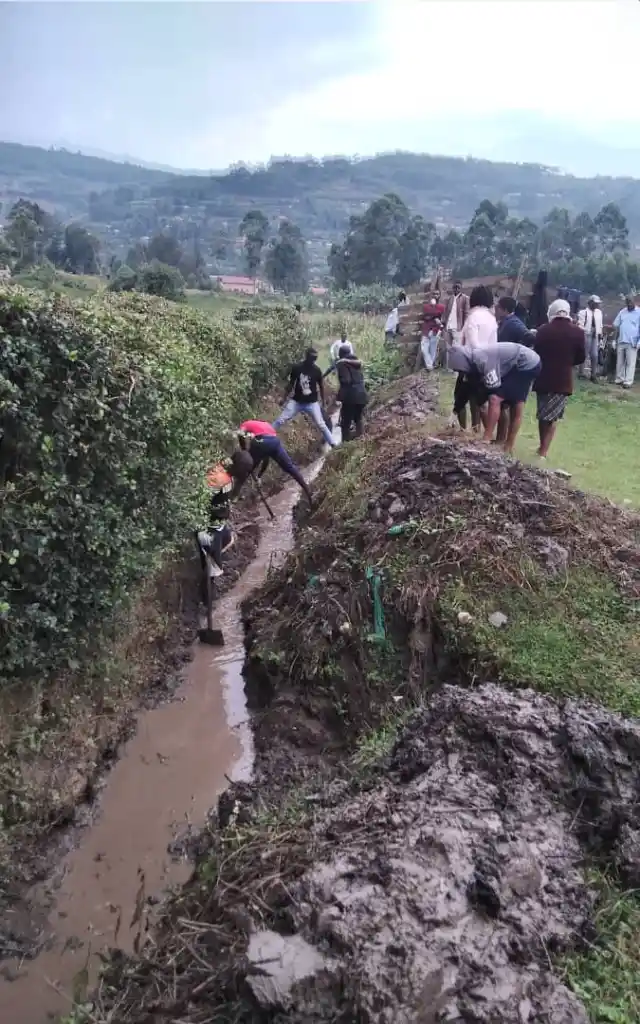By Irene Best Nyapendi
Ndayambaje Elidaphonse’s family in Kabale district, western Uganda, has access to clean and safe water for use after Uganda Christian University (UCU) students removed silt and sediment from their water source. The well near Bishop Barham University College (BBUC) serves over 300 households in the areas of Bugongi, Kibikuura, and Rwakaraba, which are near Kabale town.
An estimated 38 million of Uganda’s 45 million people lack access to a reliable, safely managed source of water with seven million lacking access to improved sanitation solutions. The grim statistics are from the 2022 report from the Ministry of Health, Uganda.

Elidaphonse, a father of three, said students showed that they “care and mind about people getting clean water.” He added: “I am happy because the bush around the well was cleared. Water that had stagnated is now flowing. We use the water for cooking and drinking.”
Pupils and students of Kigezi High School Primary and Excel High School also drink the water and use it for washing.
According to UNICEF, in Uganda, poor sanitation and hygiene as well as unequal access to safe drinking water, make thousands of children very sick and at risk of death.
Students of the UCU School of Social Sciences cleaned the community well on March 9, 2023, as part of their “corporate social responsibility.”
Catherine Atukunda Masiko, the head of the Department of Social Sciences at BBUC, said she thought it would be of great help to the university neighbors if students cleaned the well as part of their community outreach.

“I identified a well near the university that was in a very bad state; it had not been cleaned in months and the drainage system was blocked with waste,” she said. “I then shared this problem with my students who embraced the idea of us reaching out to help the community solve this problem.”
Armed with shovels, hoes, masks and gloves, over 50 students rolled up their sleeves and went into the filthy trench and emptied the well. They unclogged the rubbish which had blocked the drainage system and made the water muddy.
Every semester, the students do community engagement. It also was done as part of activities ahead of the World Social Work Day on March 21. The day promotes the contributions of individuals and communities working for society. And for the students as social workers, it is aimed at relieving people’s suffering, fighting for social justice and improving lives and communities.

“It feels so good to help. I feel humbled to deliver a service that will be enjoyed by the majority,” Amos Nomwesigwa, a participating student, said.
He said it is now a tradition for BBUC students to engage in services that help the community.
They have been to outreaches in hospitals, including, Rugarama hospital, Kabale referral hospital and cleaning Kabale town. When the students visited Rugarama hospital, they took items such as soap for the patients, cleaned the hospital and prayed for the sick. At the home for people with disabilities in Kinkugiri, they offered counseling services and an assortment of basic supplies, including soap.
The university provides funds to facilitate volunteerism. Simon Turyakira, the BBUC public relations officer, said the program enables students to be exemplary to the community so that it can learn to clean on their own.
“We did this because we want something to be done in the community,” Turyakira said. “We need to give them direction by doing it first. The students wanted to make the well clean so that people can start doing it as a routine.”
In local communities, social activities such as cleaning of water sources are initiatives of the community, led by the local council leaders. However, Turyakira explained that the local leaders cannot be blamed for the ill-kept well because sometimes they are overwhelmed by other community work on their desks.


